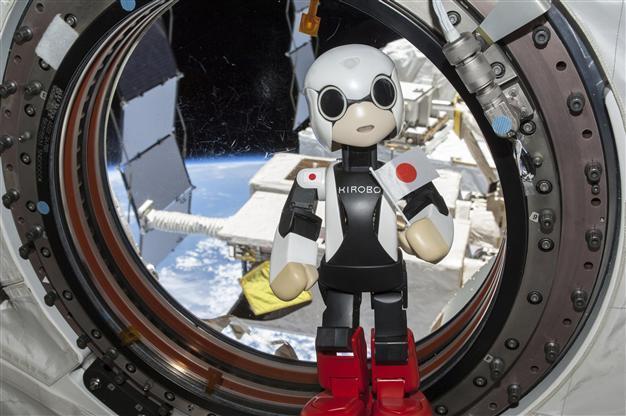Japan's robo-astronaut takes 'one small step'
TOKYO - Agence France-Presse

Humanoid communication robot Kirobo holds a Japanese national flag as it speaks a message, during a session to check the success of its first conveyance into space, at the International Space Station (ISS), in this handout photo taken August 21, 2013 and released by Kibo Robot Project on September 5, 2013. J REUTERS Photo
A pint-sized android has uttered the first robotic words in space, showcasing Japan's drive to combine cutting-edge technology with cuteness.
The wide-eyed and bootie-wearing "Kirobo" -- roughly the size of a chihuahua -- broadcast a message from inside the International Space Station, greeting citizens of Earth and paying cheeky tribute to Neil Armstrong.
"On August 21, 2013, a robot took one small step toward a brighter future for all," Kirobo said in a video that showed the humanoid creation drifting weightlessly on-board the ISS, as it moved its legs in the air.
The images made their global debut on Wednesday as part of Tokyo's bid for the 2020 Games during a presentation ahead of a meeting of the International Olympic Committee in Buenos Aires which will decide the host city.
"Good morning to everyone on Earth. This is Kirobo. I am the world's first talking robot astronaut. Nice to meet you," it said in Japanese.
The humanoid was created jointly by advertising firm Dentsu, the University of Tokyo, robot developer Robo Garage and Toyota.
The robot stands just 34 centimetres (13.4 inches) tall and weighs about one kilogram (2.2 pounds).
It left Earth on August 4 on a cargo-carrying rocket that was also delivering supplies to the ISS.
Kirobo is programmed to communicate in Japanese and keep records of its conversations with Koichi Wakata, the first Japanese astronaut to command the ISS.
The robot is part of a study aimed at seeing how a non-human companion can provide emotional support for people isolated over long periods.
